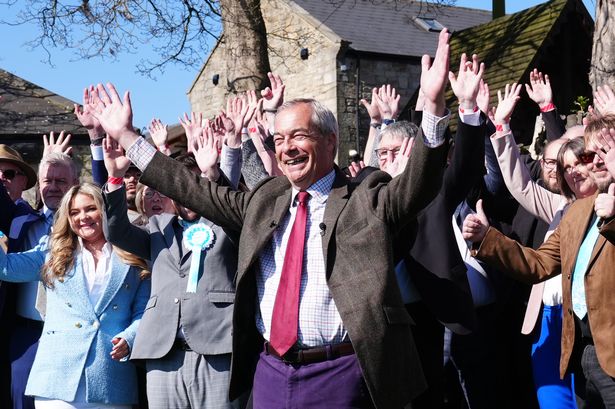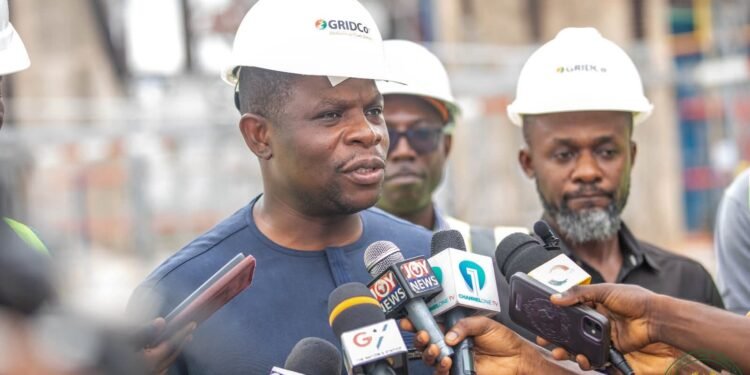Nigel Farage declared that Reform UK has firmly arrived in Labour’s traditional heartlands during a local election campaign event in County Durham, invoking bold nationalist language and stirring cultural grievances in a speech heavy on performance but light on detailed policy.
The former UKIP leader promised that “Reform are parking their tanks on the lawns of the red wall,” declaring his party the new home for working-class voters disillusioned with both Labour and the Conservatives.
“Today is the first day I’ve said that, but I absolutely mean it, and we’re here, and we’re here to stay,” Farage proclaimed to a packed room of Reform activists and candidates gathered at a working men’s club in Newton Aycliffe — a symbolic venue in the former Sedgefield constituency of ex-Labour Prime Minister Tony Blair.
Framing the Conservative Party as irrelevant in post-industrial towns across the north of England and Midlands, Farage told voters that supporting the Tories would be “wasting your vote,” asserting that “if you want a party that can beat Labour, it is now very clearly Reform.”

Echoing populist strategies seen in the U.S., Farage positioned Reform UK as the party of working-class revival, claiming it would reindustrialize neglected regions through renewed investment in fossil fuels and steel production. Polling commissioned by Reform UK was cited to support his claim that he was outperforming Labour leader Keir Starmer in so-called “red wall” constituencies.
Reform UK Revives Trump-Like Cultural Agenda
The speech leaned heavily into cultural issues, with Farage decrying diversity and inclusion initiatives, particularly in policing and healthcare recruitment. He accused public institutions of disadvantaging white Britons, stating that “we see recruitment policies … designed to put ethnic minorities to the top of the list against white people with more history in this country.” He labeled such practices “a disgrace.”
Farage rejected DEI (diversity, equity, inclusion) policies outright, describing them as “madness,” and criticized “north London human rights lawyers” for being out of touch with working-class realities. He also promised that Reform would pull the UK out of the European Convention on Human Rights and repeal the Human Rights Act, denouncing what he called “a somewhat corrupted judiciary.”
Referencing the disorder in Southport last year, Farage maintained that authorities had engaged in “the most appalling cover-up,” despite a recent cross-party Commons report refuting claims of unequal policing. He continued to paint a picture of cultural decay, warning against what he sees as a decline in national values.
In a nod to former U.S. President Donald Trump — whom Farage has long supported — he promised a “British equivalent of Doge,” referring to Elon Musk’s department of government efficiency. He argued that such an initiative would streamline councils won by Reform after the May 1 elections.
Yet for all his sweeping promises, Farage avoided giving specifics on how Reform UK would fund its plans. These include scrapping the recent national insurance hike, abolishing farm inheritance tax, ending means-testing of winter fuel payments, and raising the income tax threshold from £12,500 to £20,000 annually.
When pressed, he vaguely pointed to “the reindustrialization of Britain,” which he claimed would create “tens of thousands of well paid, in fact in many cases highly paid, jobs” within a few years. Additional revenue, he added, would come from eliminating regulators and quangos that “do so much to stifle business.”
Farage reaffirmed his support for the nationalization of British Steel and spoke of developing a constructive relationship with unions — excluding teaching unions.
“They are telling kids that Reform is a racist party … and kids that speak out against that face disciplinary action.”
Nigel Farage
As such, Reform UK’s Red Wall campaign speech marks a bold attempt to reshape Britain’s political landscape, leveraging populist rhetoric to challenge Labour dominance and rally working-class support in key battlegrounds.
READ ALSO: IMF Endorses Ghana’s Reform Measures with Fresh $370 Million Support























